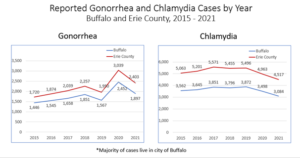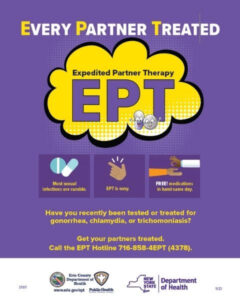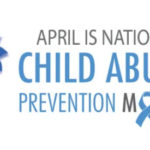Hotline introduced to expand access to free medications to treat the partners of people diagnosed with an STI – Every Partner Treated (EPT)
ERIE COUNTY, NY— In response to notable growth in certain sexually transmitted infections (STIs) in Erie County, the Erie County Department of Health (ECDOH) is sharing data about these increases and providing information about STI testing and treatment. ECDOH is also expanding its EPT – Every Person Treated – program. EPT provides prescription treatment to the partners of individuals who have been diagnosed with chlamydia, gonorrhea or trichomoniasis, without those partners having to be seen by a medical professional.
“Sexual health is an important part of overall health, and our department’s Sexual Health Clinic is here to support that aspect of personal health,” said Commissioner of Health Dr. Gale Burstein. “STI treatment is a secondary prevention strategy, and to expand access to this treatment, we created a new phone line – (716) 858-4EPT. This number and associated web site (www.erie.gov/EPT) are specifically for people who have been exposed to an STI.”
She continued, “After screening by one of our public health nurses, they can receive fast and free treatment, either through the mail or for pickup from our clinic at 608 William Street.” Treatment for all partners is an important way to reduce the risks of reinfection.
About one in five people in the U.S. has an STI, and these infections can lead to discomfort, pain in the abdomen, rectum or testicles, and infertility. “Most people with STIs do not have symptoms,” said Dr. Burstein. “But if left untreated, STIs increase the risk of getting or transmitting HIV, and can lead to miscarriages, premature labor, low infant birth weight and other harms to a fetus or baby.”
Reported gonorrhea cases in Erie County increased 56% from 2019 to 2020, even as the COVID-19 pandemic disrupted health care and the operation of the Erie County Sexual Health Clinic in 2020. Though reported chlamydia cases fell from 9% from 2019 to 2020, chlamydia tends to present fewer symptoms than gonorrhea, which may account for fewer people being tested for chlamydia.
The 14214 and 14211 ZIP codes had the greatest total of reported gonorrhea and chlamydia cases in 2021, with 24% of all chlamydia cases and 32% of all gonorrhea cases living in those ZIP codes. About half of gonorrhea and chlamydia cases are in adults ages 20-29 years old; about one out of six cases occur in adolescents and teens ages 19 and younger.
Confirmed syphilis (all stages) cases doubled in Erie County from 2020 to 2021. Cases were primarily male (78%), between 20-39 years of age (67%), and resided in the city of Buffalo (78%). More disturbingly, there were three confirmed congenital syphilis (CS) cases in Erie County in 2021. CS is a disease that occurs in infants whose mothers transmit that infection during pregnancy, and nationwide, CS cases have tripled in recent years. “Every CS diagnosis is a failure of a health system to detect and treat a treatable illness,” said Dr. Burstein. “Pregnant people should be assessed and screened for STIs, including syphilis as part of their regular prenatal care.”
A New York State Department of Health (NYSDOH) health advisory in 2021 noted that the number of new HIV infection diagnoses has been increasing in Erie County since early 2020. “PrEP (pre-exposure prophylaxis) is an effective medication to reduce their risk of HIV infection, and we can connect people with PrEP through our Sexual Health Clinic,” offered Dr. Burstein.
The Erie County Sexual Health Clinic at 608 William Street offers testing, treatment and education. Free condoms and free anal condoms are also available. This walk-in clinic is open weekdays, and available for anyone 12 years of age and older. STI testing is confidential, and no one is denied testing or treatment based on their ability to pay. Call (716) 858-7687 for information or call (716) 858-4EPT to access EPT.













